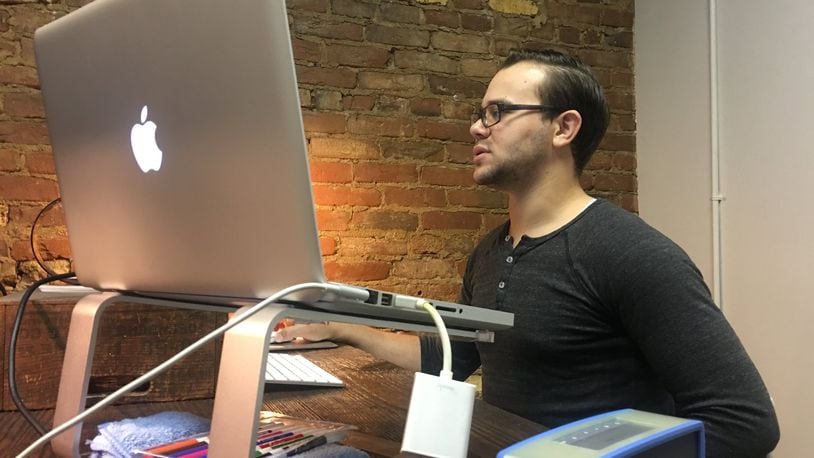A report from the Center for Generational Kinetics surveyed more than 3,000 companies, representing more than 200,000 employees. The center found five key drivers of millennial employees — and at the top of the list? They want to feel valued at their organizations and invested in their communities.
“To retain millennials, it’s crucial to not only have a workplace culture that’s desirable compared to competitors, but to provide learning and growth opportunities,” said Megan Gray, team operations manager of Marxent.
Marxent has been hailed as one of Dayton’s modern-day innovators. Located in Kettering, the company is one of the top virtual and augmented reality companies. They’ve created products for companies like Lowe’s, TimberTech and American Woodmark.
According to the report, 60 percent of millennials said a sense of purpose is part of the reason they chose to work at their employer.
Nearly 70 percent of the company’s employees are millennials. Gray said Marxent’s culture attracts the best workers to apply — and it keeps them there. The company starts by covering a new hire’s desk with Marxent brand stickers, a T-shirt, water bottles, and other items to make them feel “part of the team and company immediately.”
The employee handbook is displayed through an interactive, walk-through format via Adobe Spark, and online and in-person orientation informs new employees about practices and rituals while lending words of advice for success. Marxent has a pretty flexible PTO policy too, according to Gray.
“If you are dedicated member of the team and a successful contributor, we don’t want to slap you with strict rules and guidelines on when you can take a break,” Gray said.
The generation's desire for a transformed work experience goes beyond more vacation time and free clothes. They also want to have confidence in the leadership of the company, and want to like work they do while feeling like they've made progress most days. And according to the report,millennialswant to be treated as a person at work, not a number, according to the Center for Generational Kinetic.
“From my own perspective and that of friends and peers, there’s an overwhelming desire to be a difference maker, to do work that matters, to be in roles that are challenging and require creativity,” Ferguson said.
Mary-Ann Kabel, spokeswoman for Dayton Power & Light, said the way her company recruits millennial employees has completely changed. The company has beefed up its social media presence, communicating about job openings and sharing more about the culture.
Kabel said DP&L understands millennials — and most employees these days — want a balance between work and life. The company offers programs for emerging millennials and finds ways for employees to engage in the community — partnering with nonprofits and organizations like the American Red Cross to help workers stay in touch with their community.
“Our people, they work here, they live here,” Kabel said. “They raise their families here and they volunteer here. There’s an investment that goes beyond just the working side of the job or the monetary aspect.”
Synchrony Financial, a consumer financial services company with a presence in Kettering, wants employees to have the opportunity to invest in professional growth, development and learning. Glenn Marino, CEO of payment solutions and chief commercial officer, said the company offers various leadership programs, internships and skills training.
“We want millennials to have a voice inside the company where they can share their opinions and have an impact,” he said.
Marino said the company culture embraces innovation, with its Innovation Station located in Kettering — an example of “bringing together cross-functional teams, including millennials, to focus on technology advancements and digital capabilities for our business and collaborate on solutions and rapid testing for our partners.”
Still, manymillennialssay they want things that Dayton and its employers can't always offer. For one, there is a generation gap in Dayton — a large group of baby boomers and the generation that's just surpassed them in size, Ferguson said. That generation gap can cause tension.
“During interviews and hiring, Marxent constantly preaches about humility,” Gray said. “Humility, to us, is the magic cure. Millennials and older generations can learn from each other, no matter what the discipline, generation or level of experience. We all have something to learn and we all should stretch outside of our job descriptions sometimes.”
Jason Dorsey, a speaker and researcher for the Center for Generational Kinetics, told the Dayton Daily News that generational gaps can be addressed through communication.
“It starts with recognizing that generational differences are occurring in every industry, from healthcare and technology to manufacturing and service businesses,” he said. “Ignoring these differences only makes the problems worse and widens the gap leading to more blame.”
The stereotype of the flaky, undriven millennial who quits a job after a few weeks isn’t usually the reality, according to research. Data show about 54 percent of college-educated millennials expect to work for two to five employers over their entire careers.
“These stereotypes have some truth to them, but overall they are not accurate,” Dorsey said.
About the Author
